Of course, any football team from midget league on wants a return touchdown. But at the Super Bowl level, the interception return touchdown has far more impact than other kinds of return plays. Teams that run back a fumble for a touchdown in the Super Bowl are 2-2. Teams that run a kick back for a touchdown are 4-6, that winning total diluted by two Super Bowl victors who had both kickoff and interception return touchdowns.
The pick-six rules the Super Bowl.
Why do interception return touchdowns link so tightly with Super Bowl victory when other kinds of return touchdowns don't?
One answer may be sample size. There have been only 48 -- excuse me, XLVIII -- Super Bowls. Maybe that's not enough to wash out the role of luck in the XII-0 record for pick-six teams.
Still, the impact of the pick-six appears quite dramatic. Perhaps this is because high-level quarterback play is needed for Super Bowl success, and an interception returned for a touchdown causes the quarterback to lose confidence in himself -- or his teammates to lose confidence in him.
Fumble return touchdowns are great, but all players know that being in the right place at the right time for a scoop-and-score is almost entirely chance. Jacksonville tied for second best in fumble return touchdowns this season, despite having an awful defense, while the Seahawks' extraordinary defense did not produce a scoop-six. It's nice if chance favors your team with a fumble return touchdown, but skill or tactics rarely are issues here.
Kick return touchdowns are nice, too, but they involve special teams on both sides -- and while special-teams play is important, offense and defense are more important. Bears versus Colts in Super Bowl XLI: Chicago returned the opening kickoff for a touchdown. Indianapolis players surely thought, "Our offense and defense are better than their offense and defense." The kick-six on the opening play turned out to be Chicago's high point for the contest. Later, the Colts ran an interception back for a touchdown. In a test of pick-six versus kick-six, the pick-six prevailed. Pick-six also trumped kick-six in the Buccaneers-Raiders Super Bowl, as Oakland returned a blocked punt for a score but saw the Bucs run back three interceptions for TDs.
When the quarterback throws an interception run back for touchdown, this may mean the quarterback, the team's leader, just made a huge mistake, or that the opponent's defense is really good. Both are unsettling. Peyton Manning won his first Super Bowl, versus Chicago, then lost his next two, versus New Orleans with Indianapolis and versus Seattle with Denver. In both losses Manning threw an interception returned for a touchdown. Both times as the intercepting player scampered down the field, one could feel the air drain from Manning's team.
The pick-six can destroy a team psychologically. Early in 2013, the Texans were viewed as an AFC title contender. Then Matt Schaub threw an awful interception returned for a touchdown late against Seattle, and Houston went on to lose 12 more games for a staggering 0-14 streak. Super Bowl XXXV was close until early in the third quarter, when Baltimore's Duane Starks intercepted a Kerry Collins pass and ran it back for a touchdown; the Giants went on to lose 34-7. There are many examples of the interception return touchdown breaking a team's psychology.
Since entering the NFL in 2012, Russell Wilson has thrown one pick-six; in the same period, Tom Brady has thrown two. So far this season (including playoffs), Seattle's defense has returned three interceptions for touchdowns; New England has none.
Come Sunday, should Seattle or New England take an interception back for a touchdown, turn to your friends and confidently predict victory for that team. Act like you have access to some incredible Vegas insider service. And if the pick-six team doesn't win, remember this column's ironclad guarantee: All Predictions Wrong or Your Money Back.
In other Super Bowl keys, intermission should start around VII:L Eastern. Be sure you've made your Dagwood sandwich, gotten your craft-brewed ale and are paying attention to the second-half kickoff. Three of the past five Super Bowls have seen a major play on the second-half kickoff: the Saints' surprise onside kick versus the Colts, the Ravens' touchdown runback versus the 49ers and the Seahawks' touchdown runback versus Denver.
The extra-long Super Bowl halftime may cause loss of focus by players, creating an opportunity for the alert team on the second-half kickoff. As Tuesday Morning Quarterback detailed earlier in the season, a year ago Pete Carroll had his charges prepare for this by practicing an extra-long halftime stand-down. Surely he will again. Will Bill Belichick* (see more below) do the same?
In column news, it's time to name the recipient of the coveted "longest award in sports" -- Entertainment and Sports Programming Network's Tuesday Morning Quarterback Non-Quarterback Non-Running Back National Football League Most Valuable Player.
As with last year, I nominate, then readers decide. Before you jump to a conclusion spelled "J.J. Watt," remember only players from teams that reach the Super Bowl are eligible -- my logic being if one is to wear the mantle of Most Valuable, one must have created value. The four finalists are below. Cast your vote. The winner will be announced in next week's column.
Last week, I asked readers for their favorite bottomless pits. Mike Turschmann of White Plains, New York, noted that in "300," Leonidas has a bottomless pit in Sparta that he uses to dispose of Persians. If Sparta could build bottomless pits 2,500 years ago, why did Persia rule the ancient world? Habte Selassie of Los Angeles cites the bottomless pit that swallows up the bad guys at the end of "Lord of Illusions." Ryan Ottele of Renton, Washington, notes that in "Return of the Jedi," the evil emperor ends up hurled into a bottomless pit that conveniently is about 10 feet from his throne. I know if I ruled the galaxy, I'd want a bottomless pit in my office.
Spencer Ferrero of Los Angeles notes that in "Indiana Jones and the Last Crusade," Indy has to leap across a bottomless pit, then is pulled out of an abyss -- the secret temple had one of each! -- by his father. Victor Monjaras of Newcastle, California, points out that in the remake of "Total Recall," a bottomless pit is drilled through the core of planet Earth. John Yaeger of Minneapolis notes there is an actual bottomless pit in Minnesota.
There's a bottomless pit in the "Lord of the Rings" movies; a bottomless pit in "Terminator 3"; in the 2009 Star Trek reboot movie, the super-enormous Romulan starship features a walkway across a bottomless pit and of course the walkway has no guard rail; the final (let's hope!) Harry Potter movie had a bottomless pit. Bottomless pits have spread to television. There's a bottomless pit beneath the high school in "Under the Dome." SyFy Channel's "Defiance" has a bottomless pit beneath the ruins of St. Louis. In the remake of the remake of "Nikita" -- the version with Maggie Q -- the super-secret agency had a bottomless pit around its underground power generator. The super-secret agency's bottomless pit could be reached only by crawling through a long, narrow tunnel. So how did they build it?
The 2008 Shia LaBeouf action flick "Eagle Eye" combined two TMQ betes noires: bottomless pits and single switches that destroy things. The evil supercomputer that took over the United States government had a giant red eye suspended over a bottomless pit. Smashing the eye caused the computer to self-destruct.
The physics of bottomless pits are never spelled out. How is one built? Where does the stuff go? Why don't bottomless pits have guard rails? If the second and third "Golden Compass" movies ever are produced, the trilogy will end with Nicole Kidman hurled into a bottomless pit.
Only players from teams that reached the Super Bowl are eligible. Cast your vote nearby. Next week's column will announce the winner.
New England, offense: Dan Connolly, guard. Undrafted out of lower-division Southeast Missouri State, Connolly is the man who replaced perennial Pro Bowler Logan Mankins. For five seasons, Connolly has started almost every Patriots game. Against Indianapolis, most of the Patriots' rushing yards came up the middle between the guards. Connolly helped open holes a runner could have gone through holding a medicine ball.
Seattle, offense: Doug Baldwin, wide receiver. Undrafted out of Stanford, Baldwin was runner-up in last season's TMQ Non-QB Non-RB NFL MVP, won by Richard Sherman. The defending champions' leading receiver in 2014, Baldwin worked his way up from athletic obscurity, rendering expendable the ultrahyped Percy Harvin. Baldwin scored a touchdown in last year's Super Bowl, a touchdown in this year's playoffs and was the top receiver for Seattle's mind-bending comeback victory over Green Bay in the NFC title tilt. Also, unlike some prima donna wide receivers whose first names are spelled "Percy," he's an enthusiastic blocker.
New England, defense: Rob Ninkovich, linebacker. Kyle Arrington, Darrelle Revis and Jamie Collins have had fine years for the Flying Elvii defense, but Ninkovich is the player who drives offensive coordinators crazy. He has great instincts whether dropping into coverage or rushing the passer, and must be accounted for. Bonus: Ninkovich was let go by New Orleans (twice!) and by Miami.
Seattle, defense: Bobby Wagner, linebacker. On a team of defensive standouts, Wagner is the man who gets it done. Who's most "valuable" is usually hard to measure, but not in this case. Wagner missed a few games because of injury: Seattle was 3-2 without him, 11-2 with him. Offensive coordinators find Kam Chancellor, Earl Thomas and Richard Sherman annoying; Wagner makes them tear their hair out.
Super Bowl Preview: The Super Bowl may be over at the coin flip, since Pete Carroll and Bill Belichick both like to defer and their teams perform better when deferring.
In the postseason, the Patriots won both flips and deferred both times; the Seahawks won one opening flip and deferred. (Seattle prevailed in overtime in the NFC title game after winning the fifth-quarter coin flip -- because of the NFL overtime rules structure, everyone who wins the fifth-quarter flip elects to receive.) In the regular season and postseason, Seattle won the opening coin flip six times, deferred all six times, and went 6-0 in those contests. New England won the opening coin flip 14 times, deferring 14 times, and went 12-2 in those contests. When Seattle lost the opening coin flip, the Bluish Men Group went 8-4. When New England lost the opening flip, the Flying Elvii went 2-2.
Deferring is thought to confer a slight tactical advantage since the team that gets the second-half kickoff knows what happened in the first half, what tactics were used and what the scoreboard situation is. Deferring also creates the chance of the back-to-back score -- scoring to end the first half, then scoring again to begin the second half. This can be demoralizing for the opponent. The Patriots scored back-to-back around intermission versus Indianapolis, and it was a factor in disheartening the visitors. Carroll especially likes deferring because it means the first thing that happens is the opponent confronts Seattle's fearsome defense.
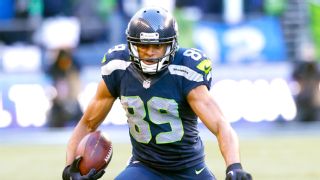
The Seahawks tend to start the game slowly, then play a monster second half. In 18 outings, Seattle posted only a 198-170 scoring edge in the first half, then was 255-123 following intermission. The Seahawks are at their best once the fourth quarter begins -- in the fourth quarter and overtime, they've outscored opponents by 74 points. About overtime: You don't want to go to a fifth stanza versus Seattle. In two overtime contests so far, versus quality opponents Denver and Green Bay, both times Seattle took the kickoff, marched the length of the field and scored a touchdown to prevail without the opponent ever touching the ball. This may mean the NFL overtime format still needs tweaking. It also means a light shines in Russell Wilson's eyes when the game becomes next-touchdown-wins.
New England's performance has been reasonably uniform, a 292-194 margin in the first half then a 265-157 margin after intermission. The Patriots' best quarter is the second. They've outscored opponents by 79 points in the second quarter, which has fourth-quarter tactical dynamics but lacks the drama of the fourth quarter.
After winning its first three Super Bowls under the Brady-Belichick regime, New England lost the next two, both to the Giants. Both times New England came in with a scoreboard-spinning high-tech offense and sputtered to a low Super Bowl score. It cannot be reassuring to Pats faithful that what caused New England to sputter in those Super Bowls was power defense played in a conventional style: four-man rush with hardly any blitzing, backpedaling linebackers, press corners. This style is exactly what Seattle specializes in. This season, New England has again spun the scoreboard with an average of 30.4 points per game, including the playoffs. If Brady's offense sputters for a third straight Super Bowl, victory is unlikely.
Since about the middle of 2013, the Seahawks have disdained the blitz -- they brought pressure on five of 65 Green Bay snaps in the NFC Championship Game, much lower than the league average of 20 percent blitzing. Tom Brady loves to be big-blitzed -- he handled big blitzes very well versus Indianapolis. Surely Seattle noticed that, increasing the chances the Seahawks will go with a conventional, Giants-style pass rush in the Super Bowl.
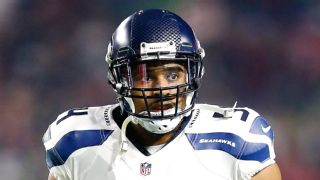
Seattle doesn't switch coverages a lot: press man-to-man and Cover 3, that's about it. Bluish Men Group defenders boast about how everyone knows what they are going to do and can't stop them. In last year's Super Bowl, Peyton Manning was so confident he would see only press man and Cover 3 that when Seattle made a surprise switch to Cover 1, Manning threw the ball directly to Kam Chancellor. Given extra time to prepare, Seattle may try to surprise Brady by offering coverages it hasn't shown on film this season.
New England's pass-wacky offense is based on constant short passing: three-quarters of the Patriots' passes in the AFC title game were short. The press coverage Seattle favors tends to frustrate short passes -- it frustrated Manning's short passing in last year's Super Bowl -- while offering the deep ball. The Belichick-Josh McDaniels drip-drip-drip passing style may not be what works versus the Seattle secondary. If New England is to win, it will have to launch deep passes. When rushing, New England will need to go straight ahead. Football lore says run away from strength and toward speed. Since Seattle has a speed-based defense, run straight at it.
When Seattle has the ball, expect a traditionalist approach of run-run-run then play-fake and throw long. In a pass-wacky era, the Seahawks' offense is a throwback. Early three-and-outs that might frustrate other teams don't seem to frustrate the Seattle offense, which knows that at some juncture late in the game, the opponent will cheat up to the line to stop Marshawn Lynch -- then watch the ball sail over its head. That's what happened in overtime of the NFC championship.
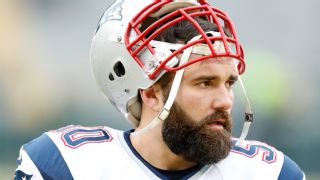
New England has been using press corners this season, playing a similar style to Seattle's. Adding Revis made press corners possible for the Patriots. (And what a canny, canny move by the Buccaneers to waive Revis: City of Tampa finished 28th in passing defense.) Utility lineman Alvin Bailey struggled at right tackle in the NFC championship. Regular starter Justin Britt is expected back, but New England may attack the right tackle position regardless. It's the weakness in the Seattle offense. This season New England has shown an excellent ability to vary between pass-oriented and run-oriented game plans. With Seattle ranking first versus the pass and third versus the run, there's no obvious attractive option.
Statistically, by yards, Seattle is superior to New England on offense as well as on defense. Football Outsiders finds the Patriots' special teams better, and three of the past five Super Bowls included important special-teams plays by the victors. The Seahawks have recovered two of five onside kicks. Since they just recovered one in the NFC championship, there's no way they would try it in the Super Bowl ... just no way, right?
Despite the popular perception, Seattle isn't called for secondary penalties that much -- a total of 23 accepted penalties for defensive pass interference, defensive holding and illegal contact. New England has been hit with those flags 35 times. That catapult move Seattle tried against Carolina's field goal formation in the divisional round? It's legal so long as the leaping guy does not climb up anyone's back. Greg Wallace of Bleacher Report notes the catapult move is not legal in high school or the NCAA, but is OK for professionals.
This Super Bowl matches the league's two best teams, two best front offices and two best head coaches, the latter at least in terms of game preparation. The latest New England ethical lapse -- how many times do the Patriots have to let the whole country down? -- means Bill Belichick henceforth will be Bill Belichick* to this column.

Disclaimer of the Week: Reader Dorothy Matalon of Newton, Massachusetts, notes the Dodge commercial picturing the 1920s Dodge brothers tinkering with vintage cars contains the small-type warning "Fictionalization. Do not attempt." She asks, "It's dangerous to fictionalize yourself?" A Nissan commercial showing a car driving through a pack of evil living snowmen says "do not attempt." If you encounter evil living snowmen, don't drive through them!
Taxing the Rich Is Right But No Panacea: Last week in his State of the Union address, President Barack Obama proposed to raise taxes on the well-to-do, mainly by increasing the top capital gains rate from 23.8 percent to 28 percent for affluent filers. There are two elements of economic logic to this proposal. The first is that contemporary economics are channeling a large share of increased income to the top. Since contemporary economics also are improving life for almost everyone, it would be foolish to tamper with the underlying dynamic. Better is to expect those at the top, who benefit from what's happening in the economy, to give more back to society.
The second element is that when Ronald Reagan cut capital gains taxes to 20 percent in 1981, at the time, there was insufficient investment capital in circulation. The lowered capital gains rate encouraged investment, which benefited the country. Today, consumer demand is low but there is almost too much liquidity in capital markets. Raising the capital gains tax should shift money from investment to spending, which is what the economy needs right now. At some future juncture, capital may be in short supply again and the tax may need to be reduced again.
So political theatrics aside, Obama's proposal may be quite sound. Here's the worry: The president wants to spend every penny of new revenue, rather than use even a portion of the tax increase to retire debt.
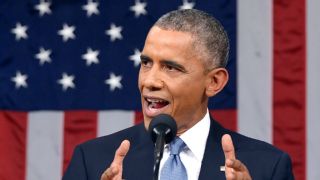
The annual federal deficit finally is in decline after nearly a decade of being way too high. But the national debt keeps growing and there isn't even a plan to deal with this problem. Once capital gains taxes on the rich go up, there won't be many arrows left in the quiver in terms of raising federal revenue. Unless the economy begins to boom like mad (possible but not likely), national debt will need to be dealt with by higher taxes on the middle class and by benefit reductions, including to Social Security recipients. The longer the political system puts off action, the worse the fix will become.
As this column notes, arguments about rising inequity tend to be anchored in income statistics where rising inequity is stark, though what really matters to most Americans is income minus taxes plus benefits. For a generation, federal income taxes have been declining for most Americans, while federal benefits have been rising. This analysis from the Brookings Institution concludes that when income minus taxes plus benefits is weighed, since the late 1970s, "Americans in the bottom one-fifth of the distribution saw their real net incomes climb by almost 50 percent. Those in the middle fifth of the distribution saw their incomes grow 36 percent."
This new article from the quarterly National Affairs details the rapid rise of federal benefits transferred to large swaths of the populace. In 1963, income redistribution through social welfare programs was 24 percent of the federal budget; by 2013, it was 59 percent of the federal budget. Author Nicholas Eberstadt concludes that federal benefit increases are the "fastest growing source of personal income" to many Americans. And not only for the poor but also for the disabled as eligibility for food stamps and lifelong benefits has expanded dramatically. Brookings is a leading liberal institution, National Affairs a leading conservative scholarly journal. Both come to the same conclusion about rising government income transfers to very large numbers of Americans.
Perhaps that is as it should be -- if contemporary economics funnels most income growth to the top, the top should be taxed more to transfer income back down. Think of this chart in terms of the economic-forces story it tells. Inequality rose as the country headed into the Depression, a time when resources were being diverted into the financial sector. Then inequality fell as Social Security came into existence: sold politically as an insurance trust but in reality an income redistribution system. From the end of World War II until around 1980, inequality was low because demand for skilled labor buoyed up hourly pay. Beginning in the 1990s, skilled labor declined in market value while intellectual property rose in value, increasing inequality. Most likely a chart like this in 20 years will show inequality entering another phase of decline, owing to ObamaCare (like Social Security, officially insurance but actually an income-transfer program) and new benefits such as those the president just proposed.
Given the nature of the contemporary economy, perhaps we're all better off with unequal income results plus higher taxes at the top than we would be if government attempted to prevent unequal income results. What's missing from this equation is any plan to deal with the national debt.
Déjà Vu All Over Again: The last time Bill Belichick's* Patriots reached the final contest and also were in hot water was Super Bowl XLII, versus the Giants, the season of Spygate. As punishment for cheating, the football gods denied New England the first 19-0 record in NFL history. Now the Patriots once again have reached the final contest while being in hot water. Will the football gods once again exact vengeance?

There are three parallels. First is that Super Bowl XLII was held at the Cardinals' field in Arizona, exactly as this Super Bowl will be. Second is that Josh McDaniels was New England's offensive coordinator during Spygate and all but surely benefited from knowing other teams' defensive signals. McDaniels is now New England's offensive coordinator again, and all but surely knew he could feel free to call lots of passes in the rain against Indianapolis because Tom Brady would be able to grip the ball. Third and far more important is that I took my daughter to Super Bowl XLII, haven't taken her to a Super Bowl since -- and am taking her to Arizona for Super Bowl XLIX. If the Patriots lose again, future New England opponents should hire her to attend games.
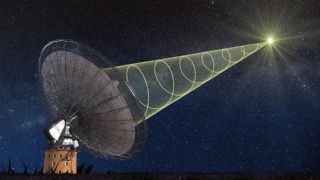
Rebel Base on Endor Receives Coded Message: When astronomers are puzzled by unknown high-energy events in the cosmos, TMQ asks: Why assume what we are seeing is natural? Perhaps astronomers are seeing the muzzle flashes of doomsday weapons. Reader Mike Kroeger of DeSoto, Kansas, pointed out this report: Several sky-scanning facilities recently have recorded an "extremely short, sharp flash of radio waves from an unknown source in the universe." Probably this is a natural phenomenon someday to be fathomed. But what if astronomers stumbled on alien military communications?
More Proof of the Decline of Western Civilization: ESPN's Michele Steele reported that "more than 100 journalists and at least 30 camera crews" attended Thursday's news conference at which Belichick* dodged questions on how to inflate footballs. Michael David Smith of Profootballtalk.com reported that Thursday evening, the air pressure in footballs was the lead story on all three evening news broadcasts for the major over-the-air networks.
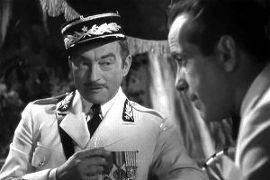
"I have no knowledge of anything," Brady said, in remarks that might have been coached by H.R. Haldeman and John Ehrlichman. "When I came in Monday morning I was shocked to learn of the news reports about the footballs," Belichick* told the packed house. Shocked, shocked! In the famous scene from "Casablanca," the moment after Captain Renault shuts down Rick's cafe because he is shocked, shocked to find out gambling was going on, the croupier walks up, hands the captain cash and says, "Your winnings, sir." Captain Renault takes the cash and says, "Thank you very much." So when Belichick* declared himself shocked about Patriots cheating, a team assistant should have walked up to the podium and said, "Your Super Bowl plane ticket, sir."
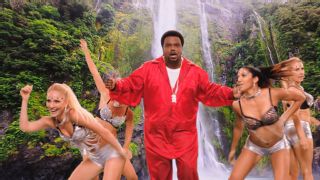
Even Comedies Can't Keep Time-Travel Plots Straight: "Hot Tub Time Machine 2" comes to theaters next month. Shouldn't it have premiered before the original?
PSIcheated: Deflategate caught on quickly, but TMQ is weary of "-gate," perhaps because there have been so many. Your columnist will call the scandal PSIcheated.
Newspaper front pages, the lead story of network evening newscasts, 24-7 cable news coverage -- if the Patriots doctored game balls, that's wrong, but why the four-alarm level of coverage?
One reason is simply that football is the king of sports. America is obsessed with this game, down to its minutiae. The NFL has an outsized role in society, and never hesitates to use that outsized role for money and ratings. When the NFL screws up, it's an outsized screwup.
Another reason is that many Americans feel the NFL has gotten too big and deserves to be brought low. This is especially true at the top of the news media, which has never understood football culture, but many who love football feel the same way. The National Football League broadcasts the word "arrogant" on all known frequencies. The public subsidies to billionaire owners, the taxpayer-funded motorcades that treat teams, owners and Roger Goodell like visiting royalty. Millions of Americans are sick of that stuff. And the NFL needs to become aware that there are millions of Americans who are sick of its excesses.
Initially mulling this, I was tempted to say another factor in the reaction is that so many people viscerally dislike Belichick*. But the Saints' bounty scandal and the Ray Rice imbroglio got four-alarm treatment, and neither involved Belichick*.
He doesn't help himself by having a public appearance style that makes Ben Bernanke seem like a stand-up comedian. Belichick's* dad was an assistant coach for Naval Academy football; the son may have grown up thinking football wasn't just an entertaining sport but every bit as important as what the United States Navy does. One of the failings of football culture is taking itself too seriously, as if football games were vital to society. Belichick* radiates this failing.
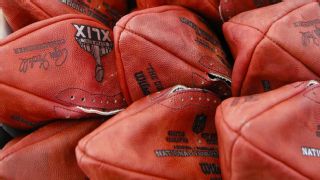
Pete Carroll has a smile on his face, likes a good time, chats up reporters, slaps fans on the back. Carroll is the gregarious host who wants everybody to come to his party. Belichick* is the angry guy who wants neighborhood kids to stop running across his lawn. The New England coach clearly despises the sports reporters whom his contract requires him to speak to, and doesn't show affection for spectators, either. This makes him seem an ingrate -- if it weren't for sports reporters and sports fans, he wouldn't enjoy a phenomenal salary. The negative energy field that Belichick* projects causes many to enjoy seeing him squirm.
But on reflection I don't think the reaction to PSIcheated is about Belichick*. It's about the assumption that people reach positions of power and privilege -- in sports, business, government, school, Wall Street -- by cheating, and most are never caught.
The American economic and cultural systems are far from perfect but are mostly open, surely less rigged than the systems of most nations. Laws are far from perfect, but in the main, American law pushes for fair competition. But if there's a fair, open competition and one person ends up with a powerful, highly remunerative position while another ends up with little or nothing, we may prefer to believe the whole thing was fixed. Seeing a powerful, wealthy person caught cheating reinforces this.
Postscript No. 1: Reader Will Krummel of St. Louis notes, "After the trick plays in the Patriots-Ravens playoff game, Tom Brady lectured the Ravens that they should read the rulebook. Meanwhile, the Patriots were breaking the rules. How arrogant."
Postscript No. 2: Even the National Federation of High Schools mandates football inflation levels. There's just no way on God's green earth the Patriots did not know about this rule.
Postscript No. 3: TMQ regularly reminds -- including in this 2007 column as Spygate started -- that there is no law of nature that says professional football must remain popular. One reason NFL games are so great is the sense that they are ultimate all-out competition. If a sense arises that the games aren't really fair, popularity will decline. Add to this that the growth of legal sports betting. In a sports-betting environment, any indication of shenanigans will be magnified.
Postscript No. 4: Andrew Luck's hand size (pinkie to thumb with fingers spread) is 10 inches, Brady's is 9.4 inches. That's a bigger distinction than it may seem. Belichick* leaves nothing to chance. Going into a rain game for the AFC title, he would have known that all other things being equal, Luck would have a better grip on the ball. He wouldn't have known the Patriots would breeze to victory.
Postscript No. 5: In September 2007, Goodell said, "The consequences are severe if you don't follow the rules and you don't play fairly." Now the NFL says it can't possibly finish an investigation until after the Super Bowl. Can't possibly! This is like when Washington deflects some controversy by appointing a commission that files its report years later.
Postscript No. 6: If the Patriots didn't tamper with the footballs, who did? I am betting the Trilateral Commission.

President Vows to Promise More Speeches: In his State of the Union address, President Obama once again called for greenhouse gas controls. General Motors, heavily subsidized by taxpayers during its recovery, recently announced a 640-horsepower car that will go zero to 60 in a drag-race-track-like 3.7 seconds. The EPA has not yet rated the new car's mpg and greenhouse gas performance: both are likely to be similar to the current Cadillac Escalade, which gets 16 mpg and emits 9.1 tons of greenhouse gases annually. Washington simultaneously denounces greenhouse gas emissions and serves as an enabler for wasteful production of greenhouse gases. That is pretty much government in a nutshell.
Make-believe promises of dramatic change, coupled to more favors for entrenched interests, are another government-in-a-nutshell. Four years ago at the State of the Union address, Obama promised a dramatic streamlining and consolidation of federal agencies. The president cited several instances of redundant federal bureaucracy, then said, "In the coming months, my administration will develop a proposal to merge, consolidate, and reorganize the federal government in a way that best serves the goal of a more competitive America." Needless to say nothing has been done, the promise quietly shelved.

Wacky Foods of the Week: You probably need a recipe for goat cheese cheesecake. I want proof the cheese came from a goat! And here's more than you ever wanted to know about red velvet. Can the red velvet martini be far behind?
Why Football Announcers Praise "Safe" Tactics: In the aftermath of Green Bay facing four fourth-and-1s in the NFC Championship Game and kicking four times, many readers, including Rebecca Wayne of Bellingham, Washington, noted that as the decisions happened, Fox's on-air announcers seemed to agree. She wrote, "So in hindsight Mike McCarthy was wrong but it wasn't obvious in real time."
After the first fourth-and-1 kick, Fox's Troy Aikman suggested the kicking unit came out for the Packers because "I think Mike McCarthy has seen enough times them not make it when they've gone for it on fourth down." After the second fourth-and-1 kick, Aikman said, "Packers fans are cringing right now ... they've now gotten down here a couple of times against a great defensive unit with short field position and have failed to capitalize."
On the third fourth-and-1 decision, Fox's Joe Buck discussed the winds facing the kicker. Of the fourth fourth-and-1, neither Buck nor Aikman said anything about the decision. On none of the four fourth-and-1 kicks did either announcer suggest Green Bay should have gone for it -- in hindsight, the conventional wisdom.
In most fourth-and-short situations, on-air personnel for CBS, ESPN, Fox and NBC (CBS provides the booth crew for NFL Network broadcasts) express approval when the coach sends out the kicking unit. Announcers tend to assume that if coaches who do nothing all year but study football think kicking on fourth-and-short is the right move, they must be right. Coaches are viewed as experts, players as lacking higher knowledge of the game. It's obvious when athletes make errors -- interceptions are not supposed to happen -- but not obvious when coaches err, thus they receive the benefit of the doubt. Announcers even use the "have to" construction. As in, "It's fourth-and-1, the Screaming Lemurs have to punt."
But commentators should be skeptical of experts!
Coaches know if they roll the dice on fourth-and-1 and the gamble fails, they will be blamed. If they do what's expected and send out the kicking unit, then lose the game, the players will be blamed. Blame-shifting is essential to understanding why so many football coaches opt for the "safe" tactic even if it reduces the odds of winning. Of course every coach wants to win, but that is not necessarily the No. 1 objective in the coach's mind. Avoiding criticism, and thus prolonging job security, may be objective No. 1.
This 2006 column details exactly the situation McCarthy was in. The column supposed a coach faced four fourth-and-1 choices and concludes that if the kicking team came in four times, the opponent would "score once more than it otherwise would have." Exactly what happened to the Packers in overtime at Seattle! This 2007 column goes into detail regarding short-yardage kick-or-go math.
Usually coaches are criticized for fourth-down tries -- Belichick* was hammered for going for it in Patriots territory at Indianapolis. McCarthy's situation is a rare case of a coach criticized for doing the "safe" thing.
Football aside: Yours truly watched the tape of the fourth-and-1 decisions and was struck by this: All four times Aaron Rodgers trotted off passively, not arguing to go for it. Can anyone believe Brett Favre in this situation would have trotted off passively? This may be emblematic of the difference between the modern analytics-based, emotionally cool approach to sports and old-fashioned passion for athletic battle.
Political aside: Hillary Clinton is so far ahead in the early polls that the very size of the lead ought to make her nervous. The Packers thought a 16-0 lead was insurmountable, too.

Push Him Real Good: Last week I said that versus Indianapolis, New England should have been called for helping the runner when the Flying Elvii fullback pushed Brady forward during a quarterback sneak. Readers, including Marcus Masciarelli of Somerville, Massachusetts, noted it is a 10-yard foul to "pull a runner in any direction at any time," and it's a foul to push a teammate to help him recover a loose ball, but pushing the runner is no longer considered helping the runner. So the Patriots fullback's move was legal. However, the officiating signal for PUSHING OR HELPING THE RUNNER still appears in the rulebook -- see Page 105, bottom right.
Sing the Whole Song! The ultrahip Idina Menzel will sing "The Star-Spangled Banner" at the Super Bowl, while John Legend performs "America the Beautiful." TMQ will save time by repeating in advance my annual complaint that only the first stanzas of the latter are sung at public events, not the deeper and more complex later lyrics. Among them: "America! America! God mend thine ev'ry flaw/confirm thy soul in self-control/ thy liberty in law."
Next Week: That Super Bowl thing you might have heard about.

